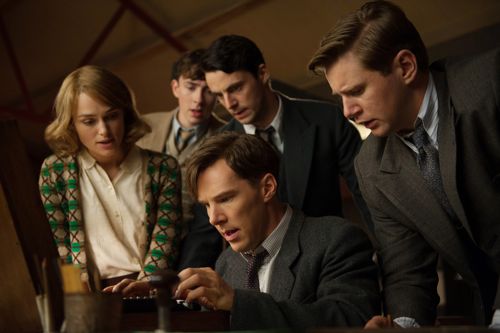
I read an article once suggesting that the structure of most anti-hero driven TV shows could be broken down to work/life irony: He’s a mob boss who isn’t the boss of his own family! He sells the American dream, but his own life is more like a nightmare! etc.
I thought of that structure a bit as I watched WWII drama The Imitation Game. Its hero, Alan Turing (Benedict Cumberbatch), is a brilliant coder, but he can’t unlock the code of human behavior. He’s literal-minded, misses idioms and ambiguity, has virtually no sense of humor. Today, we might say he’s on the spectrum.
False modesty is also something Turing is incapable of, as he displays when he applies for a job breaking Enigma, the Nazi’s coded communication system.
“They say the code cannot be broken,” says British Commander Alastair Denniston (Charles Dance), who has taken an immediate dislike to Turing.
“Let me try and then we’ll know for sure,” Turing replies.
So Denniston reluctantly hires him, but Turing quickly—and perhaps inevitably—alienates the other code breakers, including rakish Hugh Alexander (Matthew Goode) and sturdy John Caincross (Allen Leech), mostly because he just wants to build his code-breaking machine by himself. It’s Turing’s newest colleague, a puzzle expert named Joan Clarke (Keira Knightley), who suggests that he try being nice to his coworkers, if only so they’ll side with him against the increasingly impatient Denniston. This leads to a rather hilarious sequence where Turing gives his fellow coders apples and muddles his way through a tone-deaf joke.
Although she’s pretty and socially capable, Joan immediately hits it off with Turing: She’s a female in an exclusively male line of work, so she shares his outsider status; also, she’s almost as obsessed with puzzles as he is. Without even realizing he’s doing it, Turing begins some bizarro version of courting her—even throwing pebbles at her window, so he can climb up and…analyze code with her. When Joan’s parents insist she come home because it’s improper for an unmarried lady to be living on her own, he quickly proposes, using a piece of string as a makeshift ring. It’s the least romantic, and most amusing, proposal ever committed to screen.
“Is your middle name Karen or Katherine?” he asks, hastily.
“Elizabeth,” she replies.
Of course, the prospect of their marriage is doomed, not just because Turing is such an oddball, but because he’s secretly gay. This is the tragic detail of Turing’s extraordinary, but largely miserable life. He was gay at a time in London when being gay was an imprisonable offense. So on top of his alienating personality, he was also forced to live his private life in the shadows. (The film forces it into the shadows, too. Although it shows a chaste love affair he had with a friend in high school, and references Turing’s male lovers, we never see him being intimate with a man.)
You might think Turing was such an off-putting character, he’d be nearly impossible to care about, but Cumberbatch makes him unexpectedly loveable. With his imperious voice, ramrod posture, and that singular face—half dreamboat, half exotic bird—Cumberbatch has certainly excelled at playing this kind of peculiar genius before. But he brings an enormous amount of pathos to the role. Cumberbatch makes Turing almost childlike in both his passion for solving puzzles and his frustration with an alienating world.
The Imitation Game has a somewhat standard framing device—Turing is in an interrogation room, sharing his story with an avid detective—and, in its attempt to give us some semblance of a happy ending, it glosses over some of the more tragic details of Turing’s life. But it’s a cracking good story. (It’s also the kind of film that encourages one to write the words, “cracking good story.”) The aha moment when Turing figures out the key to breaking the code is something straight out of, well, Sherlock Holmes—and the life-and-death decision he and the team are then forced to make is shocking and provocative.
Still, it’s no coincidence that the film borrows a TV trope to explore its main character. It sometimes feels less like a film and more like a really great episode of British television. Which, if you’ve watched much British TV lately, is actually pretty high praise.
